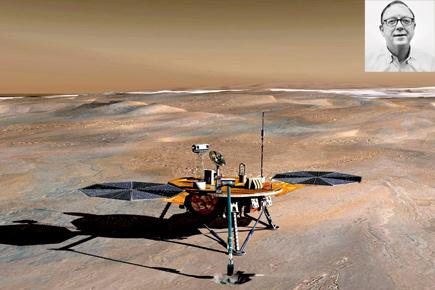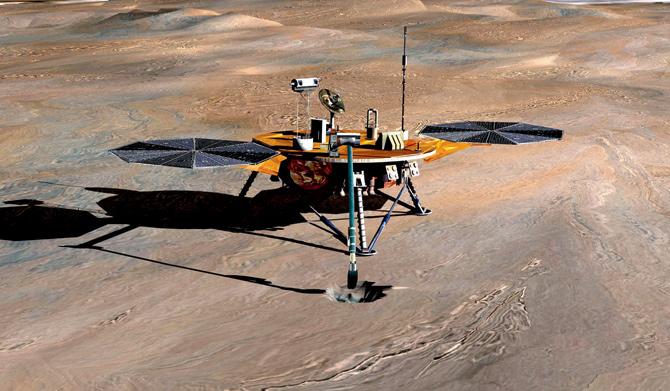In 20 years, we’ll be living on Mars. We have no choice. Panicking? Stephen Petranek’s new book is your comforter

Mars
In his just-launched book, How We’ll Live on Mars, journalist, TED speaker and writer Stephen Petranek simplifies rocket science in 76 pages straight. At the centre of his research, reporting and interviews is a very clear message: a human settlement (he prefers the term to ‘colony’) on Mars is not only possible; it is inevitable. If depleting water supplies don’t kill us, climate change will. Or a nuclear attack. Or a meteor that’s lost its way.

And a man, one of many iconoclastic entrepreneurs racing to stake first claim to Red Planet habitation, is Elon Musk, the 44-year-old South African-born, Canadian-American CEO of SpaceX, a private aerospace man-ufacturer.
In fact, it is Space X’s spacecraft, Petranek says in a telephonic interview from Virginia, that’s likely to land the first humans on Mars in 2027. Speaking of Musk’s motivations, he says that while the likes of Jeff Bezoz and Richard Branson see space tourism as a business opportunity, Musk seems focused on preserving the accomplishments of the human species by establishing a settlement on alternate ground. “If a 10 mile-wide asteroid heads towards earth, we are all going to die. And there’s a 100 per cent possibility of that happening. Musk is motivated by the proposition that human life on earth is vulnerable and sees Mars as an insurance policy.”

Stephen Petranek
Musk, he explains, has worked out the economics — he plans to reuse rockets, much like airplanes, which would make space travel a thousand times cheaper than it is today.
Of the many who are in the business of space travel, Petranek does save some criticism for Bas Landsorp’s Dutch reality show and space mission MarsOne, which aims to establish the first human settlement on Mars by 2025, two years before SpaceX. Of the initial pool of 2,00,000 candidates who signed up, three Indians have made it to the 100-member shortlist, including New Delhi resident Bhupendra Singh, 36. His response to criticism: “Even the Wright Brothers had trouble [convincing the world about aviation possibilities]”.
“They have a plan, but no hardware,” says Petranek about MarsOne. “They don’t even have the money. It will take $5- $6 billion to land the first human there, and MarsOne is nowhere close to having the funds.”
In the book, published by TED Books and Simon & Schuster, Petranek addresses every little concern that anyone can have about inhabiting another planet 250 million miles away (1 mile equals 1.6 km; do the math). But do we have the technology? “Yes, we had it 30, if not 50 years ago.” Where will Earth-Martians get food from? “It’s not a significant problem. For starters, astronauts will carry freeze-dried food. Then, they will grow plants in controlled environments (no non-vegetarian fare because we aren’t sure how animals will survive the environment). Eventually, the idea is to terraform the planet,” he says, referring to the hypothetical process through which the planet’s climate and surface will be deliberately changed to make large areas hospitable to humans.
But he agrees that certain concerns have not been addressed.
For instance, whose will be the word of law? “As per a 1960s treaty, no one can own land outside of earth. Therefore, no one owns the moon. With no regulation, Mars will be like the American Wild West. There will be no law enforcement. Early settlers will have to work out a system of self-governance. Now is the time to think about it,” Petranek suggests.
Then there is a significant risk to health from radiation from the sun and cosmic rays. “We would have to build underground habitats with walls that are 15 to 30 feet thick. While this will keep away solar radiation, there is no technology available to protect us from cosmic rays. Any amount of exposure to radiation shortens human life. Therefore, one of the sacrifices that early astronauts will make is that they will die sooner,” he adds.
While changing Mars’ atmosphere to make it more habitable for humans will be one of the more immediate projects, Petranek feels, a better solution might be to evolve human beings, who will be less affected by radiation. “We are at that point in our history where we can control the kind of human beings we reproduce. We could evolve into beings who can breathe in a lot more carbon dioxide (shortage of oxygen will be one of the significant problems on Mars) or suffer fewer consequences from radiation,” he adds.
And to the argument that it sounds much like we’ll be playing God, he says, “we are playing God now. We are using viruses to modify genes, aren’t we? I admit, there will be accidents and mistakes. Some may be catastrophic. Look at artificial intelligence. We will soon create machines that are smarter than human beings who may decide to do away with us. But it’s a brave new world and, compared to what we can do with ourselves, exploring Mars is insignificant.”
 Subscribe today by clicking the link and stay updated with the latest news!" Click here!
Subscribe today by clicking the link and stay updated with the latest news!" Click here!









